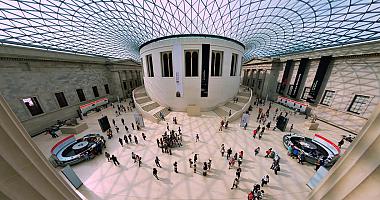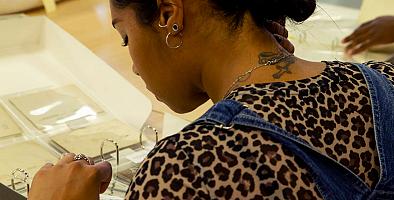MPhil/PhD History
Content navigation menu
Why study MPhil/PhD History at Goldsmiths
Undertake a research degree in History at Goldsmiths.
- The distinctive emphasis of History at Goldsmiths is a theorised, interdisciplinary and comparative approach to research.
-
We are open, friendly and accessible, and research students are encouraged to be innovative in their use of sources and methodologies.
-
We have a young cohort of staff, and they are at the cutting-edge of their fields. The student-teacher ratio allows us to devote an unmatched amount of time to individual supervision. Find out more about staff in History.
Contact
If you have specific questions about the degree, contact Alexander Watson.
Length
3-4 years full-time or 4-6 years part-time
Fees
Home - full-time: £TBC
Home - part-time: £TBC
International - full-time: £21000
School
Subject
You'll research
Each September, there is a week-long university-wide induction programme for first-year postgraduate research students in all academic disciplines. This introduces you to some of the essentials of research and gives you the opportunity to ask general questions. Research students usually follow a programme of training tailored to their needs.
Your supervisor will help you in the initial planning of your research, offering advice and suggestions as the project evolves, and maintaining regular contact through individual tutorials. Having discussed your needs with your supervisor, in the first year you undertake training to develop your research skills and techniques.
You will have the opportunity to participate in research seminars and programmes of taught options, which enable you to meet other research students.
You'll be assessed by thesis and viva voce.
Staff and their research
Research in History at Goldsmiths is esteemed internationally. History staff publish books and articles with leading international publishers and journals, and their research has been externally funded by the AHRC, the British Academy, the Panacea Society and Wellcome Trust.
Find out more about research in History at Goldsmiths.
A vibrant research community
MPhil and PhD topics in History currently include:
- The Song of the Pen: Penny Romantic Literature 1839-89
- The Freak Show in Nineteenth-Century Britain
- British Women and German Prisoners of War in the 1940s
- Decoding Dress in Interwar Detective Fiction
- The British Diaspora – Race Return Migration and Identity in 20th-Century Britain
- Atatürk and his Cult – A Visual History, 1918-1968
- Another Balkan Myth? The Extreme Right Wing in Serbia: Indigenous Phenomenon or Foreign Adaptation?
- London Schools and Children, 1870-1920
- The Seekers Found: Radical Religion During the English Revolution
Careers
Our PhD students have taken up academic posts in history and related fields around the world. Others are employed in the media and as researchers and teachers.
Fees and funding
Annual tuition fees
These are the PG fees for students starting their programme in the 2025/2026 academic year.
- Home - full-time: £TBC
- Home - part-time: £TBC
- International - full-time: £21000
If your fees are not listed here, please check our postgraduate fees guidance or contact the Fees Office, who can also advise you about how to pay your fees.
It’s not currently possible for international students to study part-time under a student visa. If you think you might be eligible to study part-time while being on another visa type, please contact our Admissions Team for more information.
If you are looking to pay your fees please see our guide to making a payment.
Funding opportunities
Find out more about postgraduate fees and explore funding opportunities. If you're applying for funding, you may be subject to an application deadline.
Paying your fees
Find out about paying your tuition fees.
Additional costs
In addition to your tuition fees, you'll be responsible for any additional costs associated with your course, such as buying stationery and paying for photocopying. You can find out more about what you need to budget for on our study costs page.
There may also be specific additional costs associated with your programme. This can include things like paying for field trips or specialist materials for your assignments.
Entry requirements
You should normally have (or expect to be awarded) a taught Masters in a relevant subject area.
You might also be considered for some programmes if you aren’t a graduate or your degree is in an unrelated field, but have relevant experience and can show that you have the ability to work at postgraduate level.
International qualifications
We accept a wide range of international qualifications. Find out more about the qualifications we accept from around the world.
If English isn’t your first language, you will need an IELTS score (or equivalent English language qualification) of 6.5 with a 6.5 in writing and no element lower than 6.0 to study this programme. If you need assistance with your English language, we offer a range of courses that can help prepare you for postgraduate study.
How to apply
You apply directly to Goldsmiths using our online application system.
Before submitting your application you'll need to have:
- Details of your education history, including the dates of all exams/assessments
- The email address of your referee who we can request a reference from, or alternatively an electronic copy of your academic reference
- Contact details of a second referee
- A personal statement – this can either be uploaded as a Word Document or PDF, or completed online
- Details of your research proposal
- If available, an electronic copy of your educational transcript (this is particularly important if you have studied outside of the UK, but isn’t mandatory)
You'll be able to save your progress at any point and return to your application by logging in using your username/email and password.
Before you apply for a research programme, we advise you to get in touch with the programme contact, listed above. It may also be possible to arrange an advisory meeting.
Before you start at Goldsmiths, the actual topic of your research has to be agreed with your proposed supervisor, who will be a member of staff active in your general field of research. The choice of topic may be influenced by the current research in History at Goldsmiths or the requirements of an external funding body.
If you wish to study on a part-time basis, you should also indicate how many hours a week you intend to devote to research, whether this will be at evenings or weekends, and for how many hours each day.
Your research proposal
Your research proposal should be in the form of a statement of your proposed area of research. It should include:
- An outline of the research topic including why it has been chosen
- Your preliminary research questions
- Your proposed sources
- If applicable, an initial hypothesis
- A brief list of major secondary sources
We expect that your proposal will be a minimum of 1,500 words and will not exceed 2,500 words (including references). The bulk of the proposal will usually deal with the first three bullet points above. You should contact your potential supervisor to discuss the proposal and its feasibility prior to submitting it.
When to apply
We accept applications from October for students wanting to start the following September.
If you are seeking any funding for your research, we strongly recommend that you apply in October. This is because funding processes are extremely competitive and successful applications often require significant liaison between the applicant and potential supervisor. That can take some months. There is unlikely to be sufficient time when applications are made after October.
We encourage you to complete your application as early as possible, even if you haven't finished your current programme of study. It's very common to be offered a place conditional on you achieving a particular qualification.
If you're applying for external funding from one of the Research Councils, make sure you submit your application by the deadline they've specified.
Selection process
Admission to many programmes is by interview, unless you live outside the UK. Occasionally we'll make candidates an offer of a place on the basis of their application and qualifications alone.
Further guidance
Find out more about applying for a postgraduate research degree.




